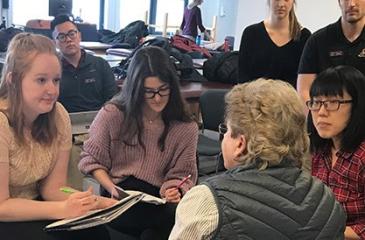The Community Teacher program at the University of Minnesota is a unique program and is a rarity in the country. It is also one of the largest. Through this experience, health professions students practice working on an interprofessional team to further develop and refine the necessary skills they will need as future health professionals on collaborative healthcare teams. Students get the opportunity to interact with real people in their community to learn about their experiences as a patient navigating chronic conditions in the healthcare system.
As part of the 1Health interprofessional education (IPE) curriculum, the Community Teacher program brings together health professions students from six participating programs with a patient volunteer called a “Community Teacher.” These Community Teacher volunteers (CTs) share with students their experiences as patients in navigating the healthcare system, managing chronic health conditions, and being an active participant in the coordination of their care.
“I wanted to participate in the CT program because there is such a disconnect between patients and providers. Very few are looking at their patient as an intricate and unique human system. Through this program, I feel I may have made headway in improving the American health system. The students listened and asked thoughtful questions and came up with suggestions that I may not have explored. I think sharing my experiences will help them to look for the patient’s story beyond the diagnosis,” said CT volunteer Deborah J. Winchell.
Oftentimes, the CT course serves as students’ first experience interacting with a patient, and through this experience, students learn from, with, and about their student peers from other health professions programs. The students converse with CTs using a patient-centered approach, which means looking beyond diseases or health conditions and considering the whole person. The students do not provide healthcare advice but rather focus on learning how to work on an interprofessional healthcare team, including understanding which questions to ask so they can work collaboratively in understanding the needs of the patient.
The 1Health Community Teacher program continues to grow year after year. An additional 120 health professions students from the Twin Cities, Duluth, and Rochester system campuses joined the course for the academic year 2023-24, bringing the total number of health professions students participating this year to over 560. Participating programs include the College of Pharmacy, Food Science and Nutrition-Dietetics, Medical School, Occupational Therapy Program, Physical Therapy Program, and School of Nursing-Masters. The Center for Interprofessional Health (CIH) and 1Health teams have a longstanding partnership with the College of St. Scholastica (CSS) in Duluth to provide CSS learners with the opportunity to engage in 1Health IPE courses. Students from the Occupational Therapy Program at CSS participate in Community Teacher.
To accommodate the increased number of students this year, the number of CT volunteers has expanded to 170. Each CT volunteer is assigned to an interprofessional team of three to four students and meets with their student team three times throughout the year, either in person or via Zoom. The CIH team provides learners and CTs with numerous resources, information, and guidelines before their first meeting and throughout the academic year.

“One of my favorite questions I ask my students is for them to tell me about their ‘a-ha’ moment—the moment they decided to pursue their particular profession, and I remind them that when the going gets tough, to keep thinking of that a-ha moment because that’s what is going to get them through the day,” said CT volunteer Kelly Praman. “I had one student who looked at my list of medications and asked why I was taking two cholesterol-lowering drugs. I proceeded to find out that it was a mistake. That student made a remarkable observation that saved my life.”
The students must first learn how to come together as a team, establishing preferred modes of communication and arranging a place and time to get together. They develop roles and responsibilities for each person. Throughout the first and second visits, they are working to gather as much information as they can on the CT’s daily life, any chronic conditions, medications they are taking, any limitations in their life currently, strengths and weaknesses, and goals for their overall health. The students develop a final paper similar to an assessment which includes recommendations they would provide a patient.
“I want to express how appreciative I am of my students' affirmation to collaborate with other health professionals after listening to one another respond to my wide-ranging health issues. It is always my hope that they will see the value of different perspectives, including my own. As a patient who regularly sees several different healthcare specialists for overlapping issues, I believe it's important that I share these experiences with my student groups. Not only do I learn more about my health during these occasions, but I also know issues can always be resolved by an interprofessional healthcare team,” said CT volunteer Linda DeBeau-Melting.
“Students have said before that the most valuable part of the CT course was engaging in patient-centered conversation with other members of their future healthcare team. And that is really the purpose of this program: students learn from real patients and work together as a team. CTs are open and willing to share their story, whether they are positive or negative experiences within the healthcare system, with the ultimate goal of helping students become better health professionals,” said Suzanne Stein, lead 1Health curriculum coordinator for the Center for Interprofessional Health.



